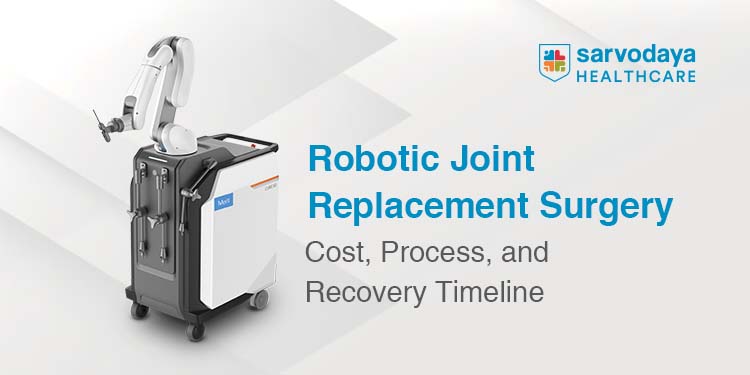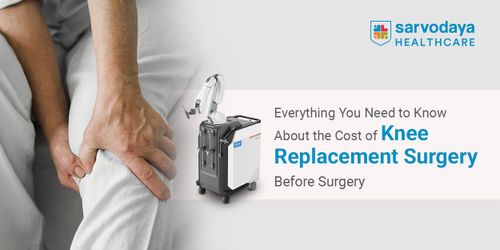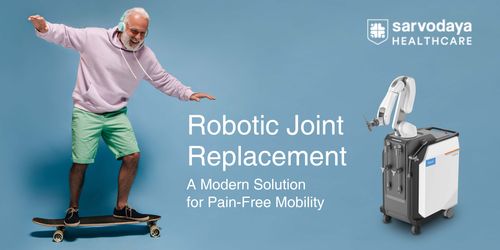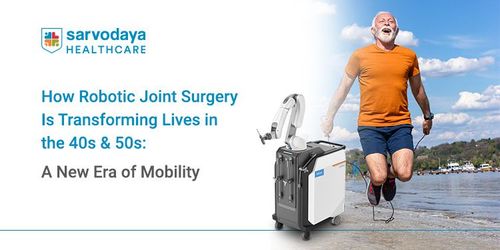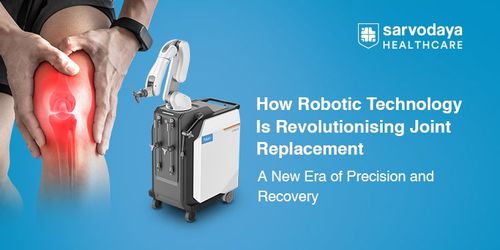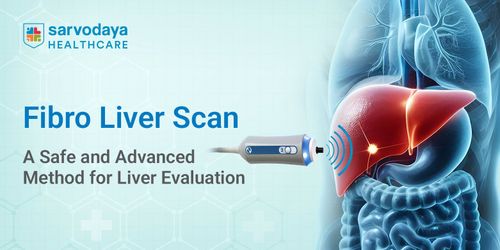In this blog, we will explore everything you need to know about robotic joint replacement surgery, from how it works and who it is for to the expected cost and recovery period.
Understanding Robotic Joint Replacement Surgery
Robotic joint replacement surgery is a cutting-edge orthopaedic surgery where the surgeon uses robotic-assisted tools to replace damaged joints with artificial implants. Unlike conventional surgery, which depends heavily on manual precision, robotic systems provide advanced 3D imaging and real-time guidance, ensuring accurate alignment and optimal implant positioning.Hospitals across the country are rapidly adopting this method, and the best orthopaedic hospital in Delhi NCR, India, now routinely offers robotic-assisted joint replacements for knees and hips.
Benefits of Robotic-Assisted Joint Replacement
This technique blends the skill of experienced surgeons with the precision of robotic assistance, offering a wide range of clinical benefits that directly impact recovery and mobility.Here are some of the key benefits:
- Reduced blood loss during the surgery as the tissue damage is minimal
- Reduced risk of infection and complications post-surgery
- Shorter hospital stays, often allowing patients to go home within 2–3 days.
- Less time is taken for rehabilitation, leading to an earlier return to daily activities.
- Less post-operative pain and reduced need for pain medication
- Due to smaller incisions and minimal scarring, there are minimal post-surgery marks.
Common Types of Robotic Joint Replacement Surgeries
While knees and hips remain the most commonly treated joints, robotic systems are also being explored for other areas like shoulders and ankles in specialised centres.Let’s take a closer look at the types of joint replacements that benefit the most from robotic assistance:
- Robotic Knee Replacement Surgery: This is the most widely performed robotic-assisted orthopaedic surgery. Especially for patients with advanced osteoarthritis, where the joint damage is significant, this surgery works wonders. A knee replacement surgeon in Faridabad can now achieve unparalleled precision in implant placement, helping patients walk pain-free again. The availability of expert care from the best knee replacement surgeon in Faridabad ensures the long-term success of the surgery.
- Robotic Hip Replacement Surgery: Robotic systems also aid in the precise positioning of hip implants, reducing the chances of joint dislocation and improving leg length accuracy. The best hip replacement hospital in Delhi NCR, India, offers this surgery with minimal downtime and superior post-op mobility.
Process: How Robotic Joint Replacement is Performed
Robotic joint replacement gives the option of tailoring the surgery as per the patient’s unique anatomy, so the surgeons can ensure optimal results and longevity of the implant.Here’s a simplified breakdown of how robotic joint replacement surgery works:
- Preoperative Planning: Detailed CT scans are used to create a 3D model of the joint, allowing the surgeon to plan the surgery with exceptional accuracy.
- Intraoperative Mapping: During surgery, the robotic system maps the joint in real-time, helping the surgeon make fine adjustments to implant placement based on the patient’s actual anatomy.
- Precision Execution: The robot performs the surgery ensuring that incisions and bone cuts are made only as much as required. The surgeon remains in full control throughout the operation.
- Implant Placement and Closure: The artificial joint is placed with high precision, followed by suturing and post-operative protocols.
Ideal Patients for Robotic Joint Replacement Surgery
Some patients benefit more than others based on the severity of their joint issues, lifestyle goals, and previous treatment history.Here are some common indicators that you may be an ideal candidate:
- Advanced joint degeneration due to arthritis or injury that no longer responds to medication or physiotherapy
- Moderate to severe pain interfering with sleep or daily movement
- Loss of joint function or mobility, affecting work or quality of life
- Need for a long-term solution, especially for active individuals or older adults
- No active infections or uncontrolled medical conditions that may affect surgery
What to Know About Robotic Joint Replacement Surgery Costs in India
While robotic joint replacement offers clear medical advantages, many patients are concerned about affordability.Here are some pointers to consider related to its pricing:
- Average range: The cost of robotic knee or hip replacement in India typically ranges between ₹2.5 to ₹4.5 lakhs per joint, depending on the city and hospital.
- City and hospital choice: Opting for the best hospital in Faridabad, Delhi NCR may come at a slightly higher price, but it ensures superior surgical precision and post-op care.
- Surgeon’s expertise: Surgeries performed by the best robotic joint surgeon in Delhi NCR, India, often have better success rates and fewer complications, which can reduce long-term expenses.
- Implant quality: High-quality or imported implants cost more but offer better durability and functionality.
- Post-op services: Charges may include physiotherapy, diagnostics, and follow-up care, which are often bundled in top-tier hospitals.
Recovery Timeline: What to Expect
The overall healing timeline may vary depending on the type of implant and the patient’s health conditions.Here’s a general recovery timeline to help set realistic expectations:
- Week 1: Focus on pain management and initial mobility. Patients often begin light physiotherapy within 24 to 48 hours of surgery.
- Week 2–4: Increased walking, improved range of motion, and reduction in swelling. Most patients can walk with minimal support.
- Week 6–12: Most daily activities can be resumed, including light exercise and driving, depending on the surgeon’s advice.
- 3–6 Months: Full recovery for most individuals. Joint stability and strength are restored with continued physiotherapy.
Choosing the Right Hospital and Surgeon
Selecting the right hospital and surgeon is quite important for the success of robotic joint replacement surgery.When selecting a facility, look for the following factors:
- Accreditation and certifications such as NABH, which indicate adherence to quality and safety standards
- Availability of the latest robotic surgical systems and trained staff
- Proven track record in joint replacement surgeries, especially robotic-assisted ones
- Patient testimonials and success stories
- Comprehensive postoperative rehabilitation services
Conclusion
Robotic joint replacement surgery represents a major advancement in orthopaedic care, combining surgical expertise with the precision of technology. Patients opting for this surgery benefit from improved implant accuracy, less pain, faster recovery, and a quicker return to their normal lifestyle.At Sarvodaya Hospital Faridabad, patients have access to world-class robotic joint replacement treatments guided by some of the best knee replacement surgeons in Faridabad and the best orthopaedic doctors in India. The hospital’s commitment to cutting-edge technology, personalised care, and comprehensive rehabilitation makes it a trusted choice for anyone seeking the best robotic surgery hospital in Delhi NCR. Additionally, Sarvodaya Hospital offers preventive consultations and early intervention strategies to help patients manage joint health effectively and avoid surgery where possible.
A consultation with the experts at Sarvodaya Hospital Faridabad can provide you with a tailored treatment plan and ensure the best possible outcomes.


